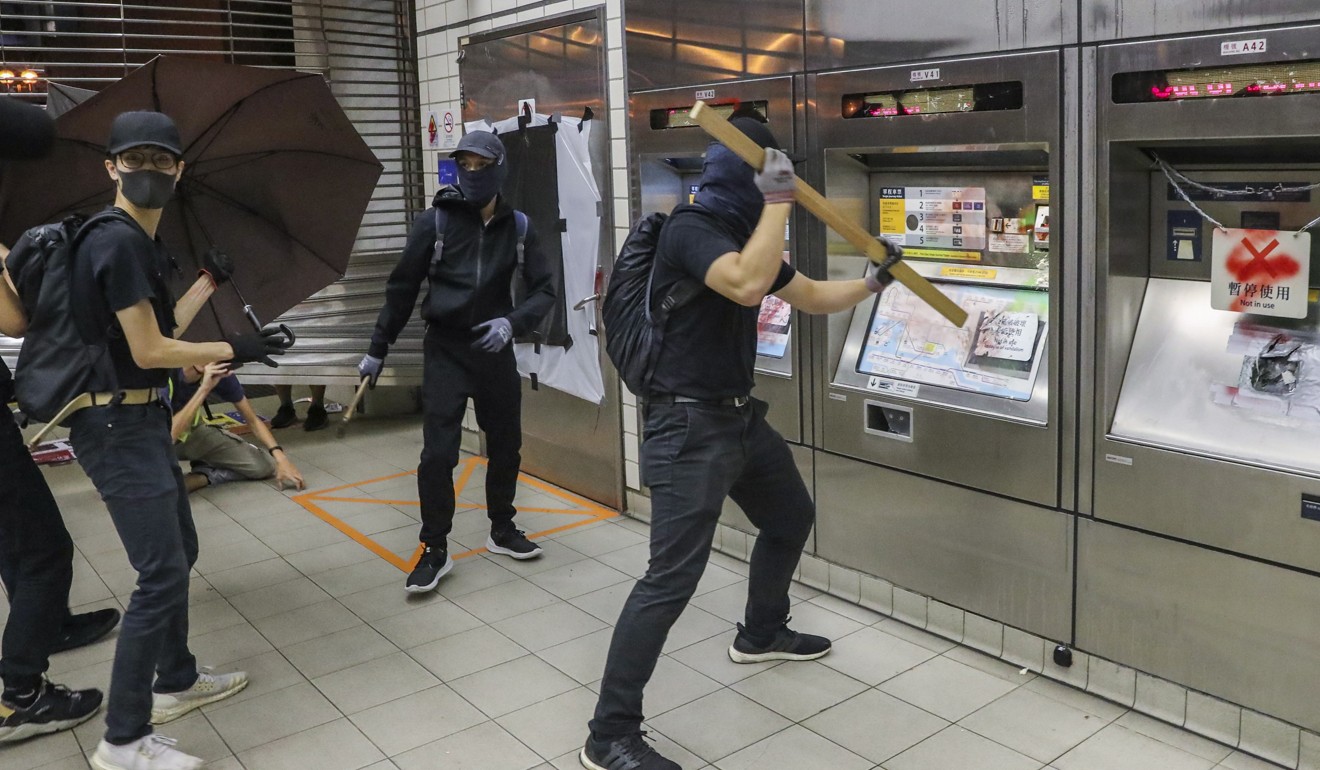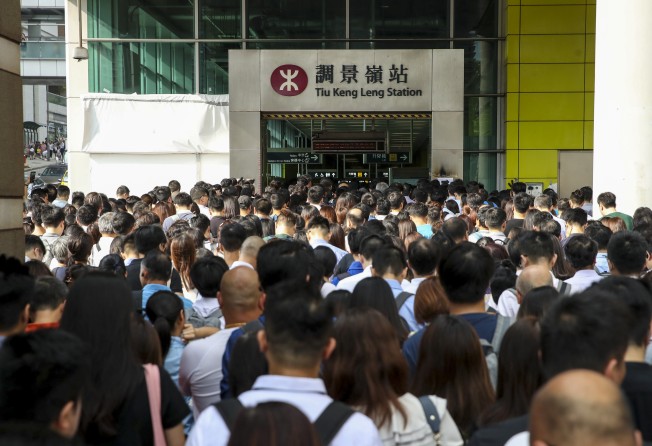
Hong Kong travel in recovery mode as MTR stations remain closed and traffic lights broken from violent backlash against mask ban by radical protesters
- Several MTR stations still closed on Tuesday with whole network to shut down early again
- Roads affected by vandalised traffic lights as city’s transport staff scramble to repair extensive damage from protests

Hong Kong’s transport network was picking up the pieces on Tuesday from a long weekend of violent protests fuelled by hatred of the anti-mask law, with 11 metro stations closed and dozens of vandalised traffic lights still under repair.
More MTR services returned after four straight days of major rail disruption due to widespread vandalism, but parts of the network were still down, while some motorists experienced heavy traffic on the streets.
Commuters living in Tseung Kwan O faced major traffic jams lasting beyond the morning rush hour after three railway stations were shut along the line serving the district. Po Lam station reopened shortly before noon on a morning which started with 13 stations closed.

The Transport Department’s assistant commissioner Tony Yau Kwok-ting said the congestion was caused by suspended train services and damage to traffic lights on the roads.
Yau said up to 250 traffic lights across the city had suffered damage and 75 sets were still not fixed, as of Tuesday morning, which marked the start of the working week after the Chung Yeung Festival on Monday.
The department called on motorists to drive with high levels of care and patience, and encouraged pedestrians to use footbridges and subways.
Yau said traffic lights in Yau Tsim Mong, Yuen Long, Sham Shui Po and Tsuen Wan districts were worst affected by vandalism over the last few days.
“Many users of roads, such as pedestrians, elderly people and children have difficulties crossing the road,” he said.
“Traffic lights also have sound devices that disabled and visually-impaired people rely on so much.
“I urge everyone to pay attention to this, not to neglect road safety and damage traffic lights.”
The new anti-mask law, which critics claimed was unconstitutional, has sparked several days of violence and vandalism as mobs of radical protesters rampaged across the city, trashing government property, MTR stations and other travel infrastructure, as well as private businesses with mainland China links.
Chief Executive Carrie Lam Cheng Yuet-ngor on Friday issued a ban taking effect at midnight on masks at all public assemblies by invoking a colonial-era emergency law not used in more than half a century.
The rail giant was a key target for protesters who have accused the MTR Corporation of colluding with police and bowing to Beijing.
The attacks led the operator to take the unprecedented step of completely shutting down the network for the first time in its 40-year history.
On Tuesday morning, bus stations in Kwun Tong and Ma On Shan were packed as rail stations were closed in the two districts.
Other major interchange areas in the city, such as Prince Edward and the Cross-Harbour Tunnel, were running smoothly.
Eric Xiao, who works in electronic engineering, usually changed from the Kwun Tong line to the Tsuen Wan line at Mong Kok station. But, as the station was closed, he had to go to Prince Edward station.
The 29-year-old said he earlier took a detour to Ho Man Tin station because of the closure of Whampoa station near his home.
“It is OK so far. Not too much trouble,” he said. “I’m amazed by how quickly the MTR can be restored.”
At Hung Hom’s Cross-Harbour Tunnel, a key link between Hong Kong and Kowloon, commuters turned up early to avoid potential jams.
Roe Siu, who is in his 30s and works in operations, said he arrived there an hour earlier because he was worried about road traffic and the possibility of fewer buses running.
“We can’t control how people act but I don’t want the public transport system destroyed,” he said.
“I’m fine with protesters peacefully demonstrating, but if what they do affects others then it’s not good.”
Another commuter surnamed Wong arrived at the bus station 45 minutes earlier than usual as she expected more people would show up later.
Wong, who works in insurance at Fortress Hill, said she did not leave her Sha Tin home over the weekend because there were limited transport options.
In the early afternoon on Tuesday, taxi driver Wong Wing-chung said he was still stuck on Lung Cheung Road in Kowloon, heading towards Tsuen Wan.
Wong said Tseung Kwan O district was the most congested in the morning.
“You can’t do business,” he said. “When you have customers in the car, you can’t do much business. When you only can earn dozens of dollars in one hour, you still suffer a loss.”
He said he had previously passed through roads in Kwun Tong, Yau Ma Tei and Tin Shui Wai with the absence of traffic lights, which he said was a reason for the congestion.
Leung Tat-chong, who manages some taxi drivers, said colleagues told him they had to drive carefully without traffic lights in Prince Edward and Mong Kok.
“It was a bit dangerous. Luckily, everyone was conscious about it. The problem was not big. But of course, there was some impact,” he said.
He said even though the rail operator had suspended services, businesses were quiet because residents were reluctant to go out.
The MTR Corp said its services would end earlier at 8pm to allow time for repairs.
The Transport Department said it had coordinated with bus operators and strengthened services in the affected areas of the MTR, increasing operations on 14 routes.
The protests erupted over the summer in opposition to the now-withdrawn extradition bill, which would have allowed criminal suspects to be sent to mainland China and other jurisdictions with which Hong Kong lacks an agreement.